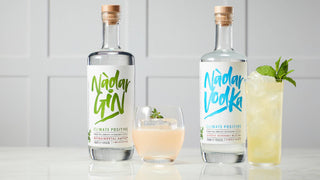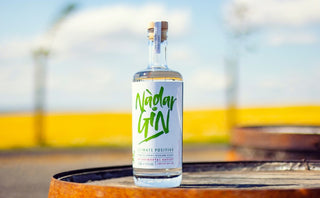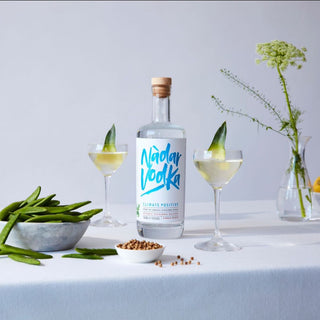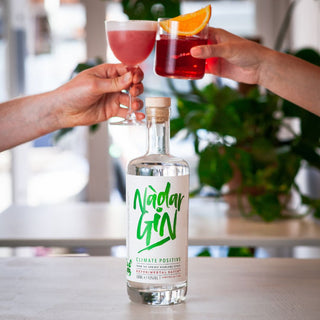
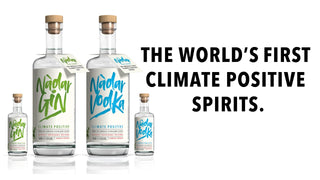
THE NÀDAR STORY
Discover the story in this 3 minute short movie. A celebration of craft, theatre and experimentation, it highlights that incredible things happen when you go against the grain.
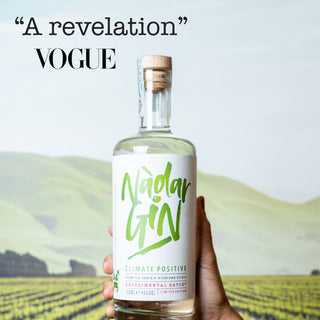
ALL OF THE TASTE. NONE OF THE IMPACT.
Meaning 'nature' in Gaelic, our revolutionary Nàdar duo harness the power of nature and science to create the world's first climate positive spirits, made from the most innovative and surprising ingredient - the humble pea.
With a carbon footprint of -1.54kg CO2e per 700ml bottle of gin and - >1.53kg CO2e per 700ml bottle of vodka, Nàdar is at the forefront of fighting climate change and biodiversity loss, avoiding more carbon emissions than it produces.
At Arbikie, we make our own base spirit, which means that we have direct control over the crops we use to make our spirits. After years of study by our Master Distiller, Kirsty Black, we concluded that peas were an ideal choice for the planet as the pea crop requires no nitrogen fertiliser.
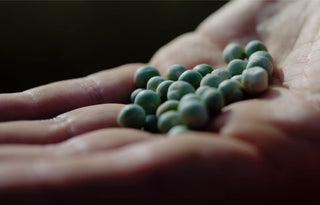
THE SCIENCE
Crops require added nitrogen to support the necessary yield and quality of crops demanded by industrialised agriculture and downstream food-systems. The excessive application and poor management of industrially manufactured (synthetic) nitrogen fertiliser has had a negative impact on the qualities of our water, air and soils – and is a major source of greenhouse gases. Peas are different, they are able to meet their nitrogen requirement from the air, thus avoiding the need for such synthetic fertilisers.
Despite most of the air that we breathe being made up of nitrogen gas, it is in a form that is inaccessible to plants other than legumes. Legumes are able to take this atmospheric nitrogen, a renewable resource, and fix it into biologically useful forms through a symbiotic relationship with bacteria, which live in the nodules on the legume roots.
MADE WITH PEAS, WITHOUT TASTING LIKE THEM.

CARBON SAVING POTENTIAL
Turning peas into alcohol is no different than any other raw material, and simply involves taking the starch component then breaking it down and fermenting it into alcohol. Following the first distillation, we are left with something known as ‘pot ale’. Pot ale can have a number of fates, from anaerobic digestion, a natural fertiliser or as animal feed.
Peas increase the protein content of the pot ale, making it even more suitable as an animal feed. Europe has a growing dependence on imported soy as a protein source for farmed animals, but its cultivation in certain countries is causing environmental damage through destruction of rainforest and cerrado regions. Therefore, growing legumes reduces carbon emissions not only through avoidance of nitrogen fertiliser, but it also reduces the dependency on imported animal feed protein sources.
All of the pot ale from this experimental batch has either gone to feed our cows or neighbouring cows.
DIVERSIFYING CROP ROTATION
Varying the crop grown within a field each year is important in soil management and the prevention of disease and pest build up. However, the current range of crops in the UK is limited. Increasing the use of legumes benefits the ecosystem in a range of ways, not only improving soil quality but also supporting beneficial insects.
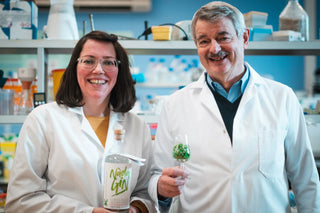
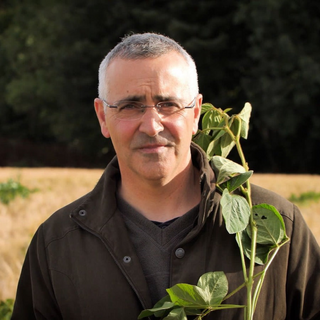
BEHIND THE SPIRITS
Arbikie Master Distiller, Kirsty Black, distilled the world’s first climate-positive spirits as her PHD project. Nàdar Gin launched in 2020 following years of endeavour by Kirsty, Dr Pete Iannetta at the James Hutton Institute and Professor Graeme Walker at Abertay University. The Life Cycle Analysis to quantify Nàdar’s environmental impact was completed by Trinity College, Dublin and Bangor University.
Support from other key partners and collaborators associated with TRUE (www.true-project.eu) a European Union funded project.





